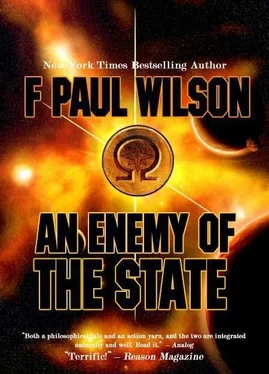“MONEY, MONEY, MONEY!” Mora was saying as they sat in the apartment, watching Radmon Sayers on the vid. “That's all you seem to care about in this revolution. There's more to a government-good or bad-than money!”
“Not much. In any government, dictatorial or representational, the politicos spend 95 per cent of their time taking money from one place and shuttling it to another. They extort money from the citizenry and then go about the tasks of passing bills to appropriate to this group, grant to that group, build here, renovate there.”
“But legislation for freedom, rights-”
“That's all decided at the outset, when the government is formed. That's when there's the most freedom; from then on it's a continuous process of whittling down the individual's franchise and increasing the state's. There are exceptions, of course, but they're rare enough to qualify as aberrations. Look back in the Imperium; one, perhaps two, pieces of legislation a year are involved purely with extension or abridgment-usually the latter-of freedom. What the public never realizes is that it really loses its freedom in the countless appropriations passed every day to create or continue the countless committees and bureaus that monitor human activities, to make countless rules to protect us from ourselves. And they all require funding.”
“Money again.”
“Correct. Keep a government poor and you'll keep it off your back. Without the necessary funds, it can't afford to harass you. Give it lots of money and it will find ways to spend it, invariably to your eventual detriment. Let it control the money supply and all the stops are out: it will soon control you! I shouldn't have to tell you this.”
“But what of culture?” Mora spread her fingers in a gesture of frustration. “Whatever culture the out-worlds were beginning to develop is dying now. What are you going to do about that? How does that fit into your plan? How're you going to tie that into economics?”
“I'm not even going to try. I don't want an out-world culture. That connotes homogenization, something the Imperium has been attempting to do. If everyone is the same, it's much easier for a central government to make rules for its subjects. I don't want one out-world culture-I want many. I want human beings to stretch themselves to the limit in every direction. I don't want anyone telling anyone else how to live, how to think, what to wear. I want diversity. It's the only way we'll keep from stagnating as a race. It almost happened to us on Earth. If we had remained on that one little planet, we'd be a sorry lot by now, if any humans at all still existed. But you can't have diversity in a controlled society. If you control the economy, you control lives; you have to bring everyone down to the lowest common denominator. You have to weed out the oddballs, stifle the innovators. Do that on all the out-worlds and pretty soon you'll have your ‘out-world culture.’ But would you want to participate?”
Mora hesitated before answering, and in the interval the vidphone chimed. LaNague took the call in the next room. He recognized Seph Wolverton's face as it filled the screen.
“News from the probe fleet,” he said without salutation. “Contact made halfway to the Perseus arm. Hostile. Very hostile from the report.”
LaNague felt his stomach lurch. “Who knows?”
“Nobody except you, me, and the man who decoded the subspace call, and he's with us.”
LaNague sighed with minimal relief. It was a bad situation, but it could have been much worse. “All right. Send a message back as prearranged. He's to return directly to Throne, with no further contact until he's in the star system, and even then he's only to identify his craft and answer no questions until he is picked up by an orbital shuttle and brought down for debriefing. See that the probe's message is erased from the comm computer. No one is to know the contents of that message. Clear?”
Wolverton nodded. “Clear.”
LaNague cut the connection and turned to see Mora staring at him from the doorway.
“Peter, what's the matter? I've never seen you so upset.”
“The probes have made contact with a hostile alien culture out toward the Perseus arm.”
“So?”
“If word of this gets to Metep and Haworth and the others, they'll have the one lever they need to keep themselves in power and maybe even save their skins: war.”
“You're not serious!”
“Of course I am. Look through history-it's a tried and true method for economically beleaguered regimes to save themselves. It works. Hostile aliens would push humans together out of fear.”
“But hostile aliens are not a war.”
LaNague smiled grimly. “That could be arranged. Again: not the first time it's happened. All Metep and the Council of Five would have to do is send a ‘trade envoy’ with a half-dozen cargo ships out toward the Perseus arm, ostensibly to open peaceful relations. If these aliens are as aggressive as the contact probe pilot seems to think, they'll either try to take possession of whatever enters their sphere of influence, or will feel directly threatened by the approach of human craft-either way, there's bound to be bloodshed. And that's all you need. ‘The monsters are coming! They ambushed unarmed cargo ships in interstellar space. Guard your wives and children.’ All of a sudden we've got to put aside our petty differences, close ranks, and defend humanity. The Imperium may be rotten and teetering, but it's the only government we've got right now, so let's not switch horses in midstream…And so on.” He shut off the torrent of words with visible effort.
Mora stared at her husband. “I've never seen you so bitter, Peter. What's happened to you these past three years?”
“A lot, I suppose.” He sighed. “Sometimes I wonder if I'm still me. But it's opposition to the men who are the Imperium-and after all, the Imperium doesn't have a life of its own; it's just people-that lets you see that there's not much beneath their reach. They'll go to any lengths, including interstellar war, just to save their careers and their places in history. The lives lost, the trauma to future generations, the chaos that would follow…they wouldn't care. It would all fall on the shoulders of the next generation. They'd be out of it by then.”
He lapsed briefly into silence, and finally came to a decision.
“I'm going to send Boedekker his signal. It's a little earlier in the game than I had planned, but I really don't have much choice. I want things in pieces by the time that pilot gets back. And even then, I must see to it that no one connected with the Imperium learns about the aliens in the Perseus arm.”
“It's almost Year Day,” Mora said softly.
“For Tolivians, yes. The Year of the Dragon begins in a few days. I suppose it will be a Dragon year for Throners, too…they'll be feeling his fiery breath soon. Very soon.”
…no government, so called, can reasonably be trusted for a moment, or reasonably supposed to have honest purposes in view, any longer than it depends wholly on voluntary support.
from NO TREASON
by Lysander Spooner
“Good evening, this is Radmon Sayers. It does not seem possible that there could be anyone watching right now who is not already aware of the catastrophic events that have rocked the length and breadth of Occupied Space today. But just in case someone has been unconscious since the early hours of the morning, I will recap:
“The Imperial mark has crashed. After holding fairly steady for years at an exchange rate of two marks per Solar credit, the Imperial mark began a steady decline at 5.7 hours Throne time. As most of you know, the Interstellar Currency Exchange never closes, but all trading in Imperial marks was suspended at 17.2 hours Throne time this evening when it hit a terrifying low of eighty marks per Solar credit. There is no telling how far its official trade value would have fallen had not trade been suspended.
Читать дальше












